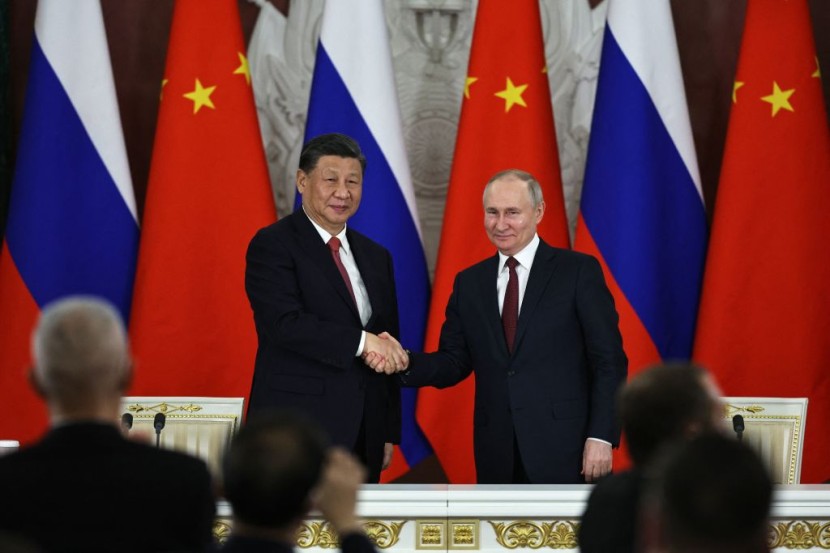
Russian President Vladimir Putin has arrived in Beijing for a highly anticipated meeting with his Chinese counterpart, Xi Jinping.
This visit is significant as it seeks to highlight the strong and unrestricted partnership between China and Russia, with President Putin addressing President Xi as his "dear friend," as per Mail Online.
Russia-China Bond in Shifting Geopolitics
As global geopolitics undergoes profound shifts, the relationship between Russia and China has emerged as a critical alliance, with economic and political dynamics reaching unprecedented levels of cooperation.
Following their "no-limits" partnership outlined before Russia invaded Ukraine, the People's Republic has been gorging on cheap Urals crude and sending more exports to its sanctions-hit neighbor. This $190 billion two-way trade relationship is up 29% since 2021 and has roughly doubled since Russia annexed Crimea in 2014.
Amidst growing isolation in the West, Moscow is left with few alternatives. The European Union's decision to drastically reduce gas imports from Russia and impose sanctions on various sectors has severely impacted the Russian economy.
Europe has also joined a US-led initiative to cap the price of transporting Russian oil, further limiting Moscow's economic options. In this scenario, it was only natural for the People's Republic to intervene.
China has been buying Urals crude at a significant discount, between 10% and 13% against Brent's price, the global oil benchmark. These discounts have enabled Beijing to save at least $10 billion on its energy bill from crude oil alone in 2022 and 2023, as the Bank of France estimated.
China has emerged as the top buyer of Russia's crude oil and coal and the second-largest buyer of liquefied natural gas and oil products from Russia. Chinese companies have also capitalized on this economic opportunity by increasing exports to Russia.
In the first nine months of the year, China's exports to Russia amounted to $81 billion, marking a 72% increase from the same period in 2021. Companies like Geely and Xiaomi have filled the void left by retreating Western companies, contributing to the surge in Chinese exports.
However, this economic partnership has its challenges. Moscow's reliance on Beijing as a key trading partner has raised concerns within Russia about becoming overly dependent on China.
Meanwhile, Russia's ongoing involvement in the Ukraine conflict has strained Western perceptions of Beijing, potentially adding to quiet frustrations. Despite the challenges, the Sino-Russian relationship has remained remarkably stable, even in the face of Russia's invasion of Ukraine, which China has refused to condemn, according to Reuters.
Russia-China Alliance
Xi Jinping and Putin have cultivated a strong personal friendship over the years. Their relationship is exemplified by the warmth of their interactions, including shared meals and traditional activities.
Both leaders hail from socialist backgrounds, with Putin's experience as a former Soviet intelligence officer and Xi's lineage of Communist revolutionaries. They have each invoked themes of national revitalization while maintaining tight control over dissent during their years in power.
Beyond the personal rapport between Xi and Putin, China and Russia view each other as counterbalances against the Western world. They describe their relationship as a "comprehensive strategic partnership" with limitless potential for cooperation.
Despite Russia's international isolation, China has refrained from condemning the Ukraine invasion and has instead positioned itself as a neutral party, blaming Western countries for the conflict. China's stance on the war can be described as "pro-Russia neutrality," which involves providing Moscow diplomatic, economic, and non-lethal military support while maintaining booming bilateral trade.
While Beijing has adjusted its approach due to concerns about Russian instability, its goal is to establish a more formalized relationship and maintain strong ties with Russia, regardless of who is in power. As Putin embarks on a rare foreign trip to Beijing, the visit is expected to solidify political support and consolidate the alliance between Russia and China.
While the world watches for significant deals, the focus is more on political reassurance than immediate economic agreements. China holds a strong negotiating position and can dictate the pace of any developments, further emphasizing Russia's growing dependence on its eastern neighbor.
As Russia and China continue to deepen their ties, their partnership is set to play a pivotal role in the ever-evolving global political landscape, challenging established Western influence and marking a new era of international relations, New18 reported
© 2025 HNGN, All rights reserved. Do not reproduce without permission.








